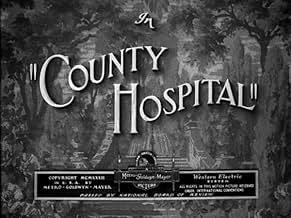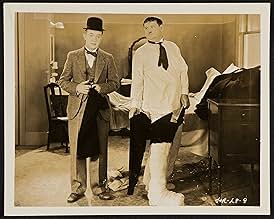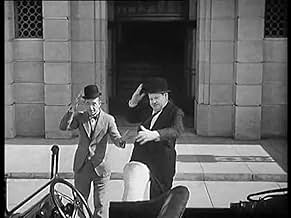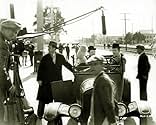CALIFICACIÓN DE IMDb
7.3/10
2.6 k
TU CALIFICACIÓN
Agrega una trama en tu idiomaIn the hospital with a broken leg Ollie is visited by Stan, who brings him hard-boiled eggs, nuts, and total mayhem.In the hospital with a broken leg Ollie is visited by Stan, who brings him hard-boiled eggs, nuts, and total mayhem.In the hospital with a broken leg Ollie is visited by Stan, who brings him hard-boiled eggs, nuts, and total mayhem.
- Dirección
- Guionistas
- Elenco
Estelle Etterre
- Nurse
- (as Belle Hare)
Lorena Carr
- Reception Desk Nurse
- (sin créditos)
Baldwin Cooke
- Orderly
- (sin créditos)
Betty Danko
- Desk Nurse
- (sin créditos)
Eleanor Fredericks
- Hospital Nurse With Baby
- (sin créditos)
Frank Holliday
- Hospital Visitor
- (sin créditos)
Ham Kinsey
- Orderly
- (sin créditos)
Carl M. Leviness
- Doctor
- (sin créditos)
Bob Minford
- Orderly
- (sin créditos)
Harry Wilde
- Hospital visitor reading newspaper
- (sin créditos)
Opiniones destacadas
There is a scene in James Parrot's short County Hospital, which stars Stan Laurel and Oliver Hardy, where, upon visiting his best friend Hardy in the hospital, Laurel sits idly, salting a hard-boiled egg and eating it. There's no joke, there's no real punchline, and there's no real purpose; it's about as literal as a scene could get. If only there was a way to tell the late writer H.M. Walker along with Parrot and Laurel that they may have fundamentally erected the popular idea/concept of anti-humor all the way back in 1932.
Although it does feature crisp sound and dialog, County Hospital is still so much a Laurel and Hardy short because of the fact it is more about situational humor than dialog-driven humor. Some readers of mine may mistake the idea that I have a disdain for situational humor, although, when I see the humor done smoothly and humorously, that couldn't be further from the truth. Laurel and Hardy knew what they wanted to accomplish and that was the concept of slapstick, silly humor. The wise-cracking, satirical humor that could make you laugh and ponder was left to Charlie Chaplin and the Marx brothers, which could arguably be why their films come to mind quicker than most Laurel and Hardy films do, on the topic of classic comedy films.
The short concerns Laurel arriving to the hospital to comfort Hardy after he received a broken leg, which already feels like the sequel to another one of their shorts gone awry. He brings hard-boiled eggs and nuts - to which Hardy replies with the sole line that essentially sums up the characters in each of their shorts - but Hardy realizes that while Laurel means well, he consistently causes trouble for the both of them. Hardy cannot remember the last time he endured such a restful experience, with two more months in a hospital bed to go, but Laurel ruins all of that with his well-meaning but trouble-causing actions.
County Hospital's only burden is its atrociously fake scene involving a sleepy Laurel trying to drive a vehicle with Hardy in the backseat, a scene that is understandable given the thought of the technological limitations of the early 1930's along with the short's budgetary issues. It's little bother; the film that was made instead was a fun piece of work, with self-referential gags and questionably pioneering ones as well.
Starring: Stan Laurel and Oliver Hardy. Directed by: James Parrot.
Although it does feature crisp sound and dialog, County Hospital is still so much a Laurel and Hardy short because of the fact it is more about situational humor than dialog-driven humor. Some readers of mine may mistake the idea that I have a disdain for situational humor, although, when I see the humor done smoothly and humorously, that couldn't be further from the truth. Laurel and Hardy knew what they wanted to accomplish and that was the concept of slapstick, silly humor. The wise-cracking, satirical humor that could make you laugh and ponder was left to Charlie Chaplin and the Marx brothers, which could arguably be why their films come to mind quicker than most Laurel and Hardy films do, on the topic of classic comedy films.
The short concerns Laurel arriving to the hospital to comfort Hardy after he received a broken leg, which already feels like the sequel to another one of their shorts gone awry. He brings hard-boiled eggs and nuts - to which Hardy replies with the sole line that essentially sums up the characters in each of their shorts - but Hardy realizes that while Laurel means well, he consistently causes trouble for the both of them. Hardy cannot remember the last time he endured such a restful experience, with two more months in a hospital bed to go, but Laurel ruins all of that with his well-meaning but trouble-causing actions.
County Hospital's only burden is its atrociously fake scene involving a sleepy Laurel trying to drive a vehicle with Hardy in the backseat, a scene that is understandable given the thought of the technological limitations of the early 1930's along with the short's budgetary issues. It's little bother; the film that was made instead was a fun piece of work, with self-referential gags and questionably pioneering ones as well.
Starring: Stan Laurel and Oliver Hardy. Directed by: James Parrot.
Stan Laurel and Oliver Hardy were comedic geniuses, individually and together, and their partnership was deservedly iconic and one of the best there was. They left behind a large body of work, a vast majority of it being entertaining to classic comedy, at their best they were hilarious and their best efforts were great examples of how to do comedy without being juvenile or distasteful.
Although a vast majority of Laurel and Hardy's previous efforts ranged from above average to very good ('45 Minutes from Hollywood' being the only misfire and mainly worth seeing as a curiosity piece and for historical interest, and even that wasn't a complete mess), 'Two Tars' for me was their first truly classic one with close to flawless execution. Didn't find 'County Hospital' quite one of their very best, but it to me still very good and some of the best material is among their funniest.
Admittedly, the story is pretty thin and is pretty standard and it does run out of steam at the end complete with some very obvious back projection and sluggish editing, both of which fake-looking.
Despite that, 'County Hospital' is great fun, never less than very amusing and the best moments, being classic hilarity. It is never too silly, there is a wackiness that never loses its energy and the sly wit is here, some of the material may not be new but how it's executed actually doesn't feel too familiar and it doesn't get repetitive. A lot happens yet it doesn't ever feel rushed or over-stuffed. The first half is terrific and one of the better first halves of Laurel and Hardy's output from this period.
Laurel and Hardy are on top form here, both are well used, both have material worthy of them and they're equal rather than one being funnier than the other (before Laurel tended to be funnier and more interesting than Hardy, who tended to be underused). Their chemistry feels like a partnership here too, before 'Two Tars' you were yearning for more scenes with them together but in 'County Hospital' and on the most part from 'Two Tars' onwards we are far from robbed of that. Their comic timing is impeccable.
Excepting the editing at the end, 'County Hospital' looks good visually, is full of energy and the direction gets the best out of the stars, is at ease with the material and doesn't let it get too busy or static. The supporting players are solid, especially Billy Gilbert, but it's Laurel and Hardy's show all the way.
In summary, very good if not one of the best. 8/10 Bethany Cox
Although a vast majority of Laurel and Hardy's previous efforts ranged from above average to very good ('45 Minutes from Hollywood' being the only misfire and mainly worth seeing as a curiosity piece and for historical interest, and even that wasn't a complete mess), 'Two Tars' for me was their first truly classic one with close to flawless execution. Didn't find 'County Hospital' quite one of their very best, but it to me still very good and some of the best material is among their funniest.
Admittedly, the story is pretty thin and is pretty standard and it does run out of steam at the end complete with some very obvious back projection and sluggish editing, both of which fake-looking.
Despite that, 'County Hospital' is great fun, never less than very amusing and the best moments, being classic hilarity. It is never too silly, there is a wackiness that never loses its energy and the sly wit is here, some of the material may not be new but how it's executed actually doesn't feel too familiar and it doesn't get repetitive. A lot happens yet it doesn't ever feel rushed or over-stuffed. The first half is terrific and one of the better first halves of Laurel and Hardy's output from this period.
Laurel and Hardy are on top form here, both are well used, both have material worthy of them and they're equal rather than one being funnier than the other (before Laurel tended to be funnier and more interesting than Hardy, who tended to be underused). Their chemistry feels like a partnership here too, before 'Two Tars' you were yearning for more scenes with them together but in 'County Hospital' and on the most part from 'Two Tars' onwards we are far from robbed of that. Their comic timing is impeccable.
Excepting the editing at the end, 'County Hospital' looks good visually, is full of energy and the direction gets the best out of the stars, is at ease with the material and doesn't let it get too busy or static. The supporting players are solid, especially Billy Gilbert, but it's Laurel and Hardy's show all the way.
In summary, very good if not one of the best. 8/10 Bethany Cox
"County Hospital" is a perfectly fine L&H short until the final sequence. I always enjoyed the scenes where Stan roams the hospital halls looking for his buddy (trying to figure out what a "solarium" is) and accidentally wanders into the maternity ward; he's mightily relieved when he finds out he's on the wrong floor! I also very much enjoy Ollie's scenes with doctor Billy Gilbert and silly Englishman William Austin. The film is also enlivened by the nurses, played by Estelle Etterre (who laughs hysterically when she finds that Stan has accidentally injected himself with a sedative) and May Wallace (who joins in the laughter and says, "He'll sleep for a month!" -- so much for medical ethics).
Personally, I always liked the scene where Dr. Gilbert is flung out the window of Ollie's room on the top floor--it adds a little action to a film where the longest scene is a single take of Stan trying to eat a hard-boiled egg. Also, the gag with the egg dropping into an unseen container by Ollie's bed and making a metallic clunk is NOT a mistake--the joke is that we think at first the egg has dropped into a chamber pot (ask your grandparents what that is), but as Stan brings it up into view we're relieved to see it's only a pitcher. The same gag happens in the team's earlier short "Helpmates," where Stan drops an alarm clock into an unseen container under his bed.
As for the final sequence with the back projection, it's not so much the quality of the film running behind the boys as a problem of sluggish editing. If the shots had been much shorter--and if we'd had a few more cutaways outdoors than just the one of the car skidding on a wet road--the sequence might have worked. Roy Seawright, who did the special effects scenes at Roach's, was a good friend of mine and his crew generally did top-notch work-- check out the split-screen scenes in "Our Relations" and "Brats," the animated bubbles in "Swiss Miss," and all of the effects work in Hal Roach's feature "Topper."
Personally, I always liked the scene where Dr. Gilbert is flung out the window of Ollie's room on the top floor--it adds a little action to a film where the longest scene is a single take of Stan trying to eat a hard-boiled egg. Also, the gag with the egg dropping into an unseen container by Ollie's bed and making a metallic clunk is NOT a mistake--the joke is that we think at first the egg has dropped into a chamber pot (ask your grandparents what that is), but as Stan brings it up into view we're relieved to see it's only a pitcher. The same gag happens in the team's earlier short "Helpmates," where Stan drops an alarm clock into an unseen container under his bed.
As for the final sequence with the back projection, it's not so much the quality of the film running behind the boys as a problem of sluggish editing. If the shots had been much shorter--and if we'd had a few more cutaways outdoors than just the one of the car skidding on a wet road--the sequence might have worked. Roy Seawright, who did the special effects scenes at Roach's, was a good friend of mine and his crew generally did top-notch work-- check out the split-screen scenes in "Our Relations" and "Brats," the animated bubbles in "Swiss Miss," and all of the effects work in Hal Roach's feature "Topper."
With Hardy laid up in hospital with a broken leg, Laurel decides to pay him a visit, brining with him a gift of nuts and hard boiled eggs. He finds a relaxed and worry free Hardy, however the chaos the unwitting Laurel unleashes unto an unprepared hospital threatens to change all that.
The feeling of being a bit forced prevents this short from being considered Laurel and Hardy at their best. An example of what I mean is evident in the first few moments, Laurel finding Hardy's room gives rise to a little confusion but Laurel overplays his normal/confused/normal expression switches and for no real reason. Likewise many of the jokes are things they know work, but have to force to fit. There are some funny bits that are both subtle (Laurel eating the egg) or physical (hanging out the window) or climactic (the drive home) and most of them are good but it doesn't feel as fresh and lively as it often has.
Laurel overplays but Hardy is as good as ever. He is given less to do than he should have been and the film is allowed to rest too heavily on Laurel, but both still do pretty well. Overall this is an enjoyable short but feels like they are were lacking ideas and were treading water a tad for this one. That said, Laurel and Hardy treading water is often still better than many modern comedians who struggle to have an output of 1 or 2 films a year, never mind L&H's output!
The feeling of being a bit forced prevents this short from being considered Laurel and Hardy at their best. An example of what I mean is evident in the first few moments, Laurel finding Hardy's room gives rise to a little confusion but Laurel overplays his normal/confused/normal expression switches and for no real reason. Likewise many of the jokes are things they know work, but have to force to fit. There are some funny bits that are both subtle (Laurel eating the egg) or physical (hanging out the window) or climactic (the drive home) and most of them are good but it doesn't feel as fresh and lively as it often has.
Laurel overplays but Hardy is as good as ever. He is given less to do than he should have been and the film is allowed to rest too heavily on Laurel, but both still do pretty well. Overall this is an enjoyable short but feels like they are were lacking ideas and were treading water a tad for this one. That said, Laurel and Hardy treading water is often still better than many modern comedians who struggle to have an output of 1 or 2 films a year, never mind L&H's output!
Stan and Ollie's best shorts are filled to the brim with accidents, destruction and disasters from the tiny to the large: 'Big Business' (1929; silent), 'Busy Bodies' (1932), 'The Music Box' (1932), 'Towed in a Hole' (1932), and 'Dirty Work' (1933). Innocent Stan unwittingly causes no end of anxiety, trouble, exasperation and pain for long suffering Ollie.
'County Hospital' is true to this wonderful formula for the first two thirds of the film. Stan visits Ollie in the hospital, and continually exasperates him with his little behavioral quirks and oddities. Then after the doctor comes in, Stan lifts the truss weight from the floor, and very quickly the doctor winds up hanging out the top story window while Ollie is being hung upside down from the ceiling by the cast on his leg, the doctor's clothes are ripped, and as Ollie falls, his bed collapses.
All the scenes in the hospital are vintage Laurel and Hardy; even though he does most of his acting immobile in bed, Ollie is Ollie! The film dies as soon as they leave the hospital, and there is a flat back projection careening car ride with Stan supposedly sleeping while driving that is simply not funny because it is so obvious the boys are spinning in a car in front of a screen. The weak ending shows them spinning around in an L-shaped car (which had wrapped itself around a pole).
My grandchildren enjoy watching it, but the ending detracts too much for this to be one of their top top bests. I give it a 7.
'County Hospital' is true to this wonderful formula for the first two thirds of the film. Stan visits Ollie in the hospital, and continually exasperates him with his little behavioral quirks and oddities. Then after the doctor comes in, Stan lifts the truss weight from the floor, and very quickly the doctor winds up hanging out the top story window while Ollie is being hung upside down from the ceiling by the cast on his leg, the doctor's clothes are ripped, and as Ollie falls, his bed collapses.
All the scenes in the hospital are vintage Laurel and Hardy; even though he does most of his acting immobile in bed, Ollie is Ollie! The film dies as soon as they leave the hospital, and there is a flat back projection careening car ride with Stan supposedly sleeping while driving that is simply not funny because it is so obvious the boys are spinning in a car in front of a screen. The weak ending shows them spinning around in an L-shaped car (which had wrapped itself around a pole).
My grandchildren enjoy watching it, but the ending detracts too much for this to be one of their top top bests. I give it a 7.
¿Sabías que…?
- TriviaThe exterior of the County Hospital was the City Hall for Culver City. Part of the frontage is still standing, albeit inside a compound.
- ErroresTodas las entradas contienen spoilers
- Citas
The Doctor: Ah! Good morning, good morning, good morning! And how is my little patient today?
Oliver: Just fine, thank you, doctor. This is my friend, Mr. Laurel.
The Doctor: I hope I find you well?
Stanley: Thank you, ma'am.
- Créditos curiososThe original MGM credits were replaced around 1937 for a reissue in which the names of the director and others were removed. The Film Classics reissue, based on the 1937 reissue (and issued on DVD), removed all references to MGM although the opening lion can still be heard on the soundtrack.
- Versiones alternativasThe original print of this film is probably lost. The available version (also on DVD) is a Film Classics reissue print derived from an MGM 1937 reissue when the director and technical credits were removed. The Film Classics version also removed the MGM lion, although it can still be heard on the soundtrack.
- ConexionesEdited into The Best of Laurel and Hardy (1968)
Selecciones populares
Inicia sesión para calificar y agrega a la lista de videos para obtener recomendaciones personalizadas
Detalles
- Fecha de lanzamiento
- País de origen
- Sitio oficial
- Idioma
- También se conoce como
- Hospital provincial
- Locaciones de filmación
- Productora
- Ver más créditos de la compañía en IMDbPro
- Tiempo de ejecución19 minutos
- Color
- Relación de aspecto
- 1.37 : 1
Contribuir a esta página
Sugiere una edición o agrega el contenido que falta

Principales brechas de datos
What is the Spanish language plot outline for County Hospital (1932)?
Responda































